Homemade baby food introducing solids schedule is a guide on what foods to introduce to your baby at different stages. A great way for making sure they get plenty of variety!
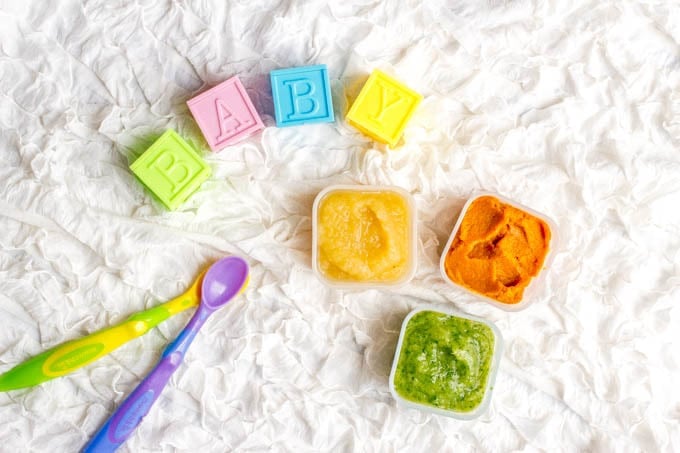
Introducing solids to your little one -- which just means supplementing the breast milk or formula they are getting with baby food purees -- is an exciting and somewhat scary time.
It can be intimidating to know what to do, when and how.
I've put together a lot of homemade baby food resources on this blog to help you through the process of making your own baby food.
Cause if that's something you're interested (and totally fine if not!), I just want you to know that it's so, so easy. I promise!
I've even written a cookbook all about making healthy, easy baby food! The Healthy, Quick & Easy Baby Food cookbook is available on Amazon and in many booksellers.
It's got all the info and resources you need to get started, plus 100 recipes ranging from single purees to combinations to finger foods and toddler meals. You'll have everything you need in one place! (Also, it makes a great gift!)
Today though, I've created a homemade baby food introducing solids schedule for you to use as a guide to beginning this journey.
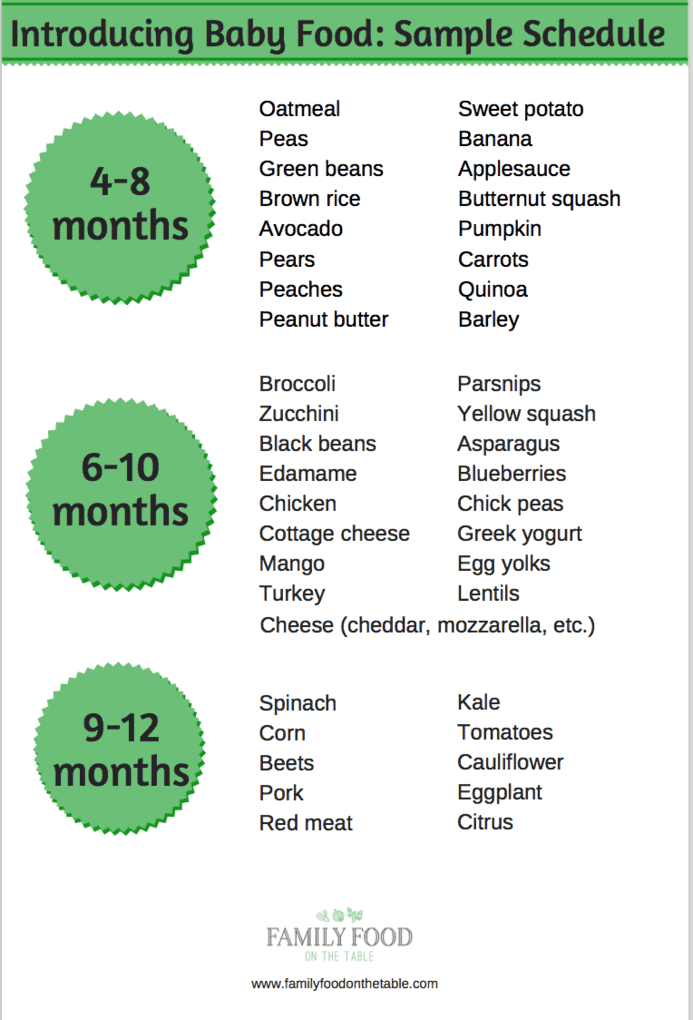
This list is what I researched and used when introducing baby food to M and I mostly stuck to the same thing with J. My kiddos loved purees and were not big on baby-led weaning, so this is the route I took.
(And if you want to save that schedule above, I made a free printable PDF for you!)
General Guidelines on Introducing Solids:
- Currently, the recommendation is to introduce solids to a baby somewhere between 4 and 6 months old, depending on the child's readiness. Talk to your pediatrician about when to introduce solids for your baby.
- Wait 3-5 days between introducing new foods, to monitor for an allergic reaction.
- Speaking of allergies, current research says it's OK to introduce peanut products as early as 4-6 months old. (This is new since my kids were babies.) If you are concerned about a possible peanut allergy, please check with your health care provider before offering any type of peanut product to your baby.
- You can refrigerate homemade baby food for up to 3-5 days and freeze baby food for up to 6 months. Just be sure to label everything!
- Got extra? I've got tons of ideas and recipes (and a video and free printable, too) for ways to use leftover baby food.
- Check out my master list of homemade baby food resources for more info.
Also, if you are new to this journey, check out my guide on how to make homemade baby food purees. I walk you through ALL the ins and outs of making purees at home, including step-by-step instructions for 10 favorite beginner purees.
I hope this homemade baby food introducing solids schedule is helpful for you to get started!
Oh, and if you have a fussy teething baby that's 8 months or older, definitely check out these homemade baby teething biscuits.
And if you want to be super efficient in making baby purees, it's all about the batch cooking.
Here are my collections of beginner homemade baby food batch cooking -- lots of beginner baby food basics grouped together to make the most out of your precious time. You can knock out 5 foods in as little as 20 minutes!
These batch cooking guides will also give you step-by-step details on how exactly to prepare various foods for your baby.
Homemade baby food round 1: peas, green beans, applesauce, butternut squash, oatmeal
Homemade baby food round 2: sweet potato, brown rice, chicken, pears, banana
Homemade baby food round 3: quinoa, peaches, avocado, pumpkin, cottage cheese
Homemade baby food round 4: broccoli, zucchini, yellow squash, black beans, Greek yogurt
Homemade baby food round 5: asparagus, barley, edamame, blueberries, mango
Homemade baby food round 6: apricots, prunes, egg yolks, chick peas, blackberries
Lastly, have fun with it! It's exciting to see your baby discover the joys of different food and flavors!
Enjoy and let me know if you have questions! I am more than happy to try and help
XO,
Kathryn
P.S. Here's the FREE PRINTABLE again if you want to print this schedule out to save.
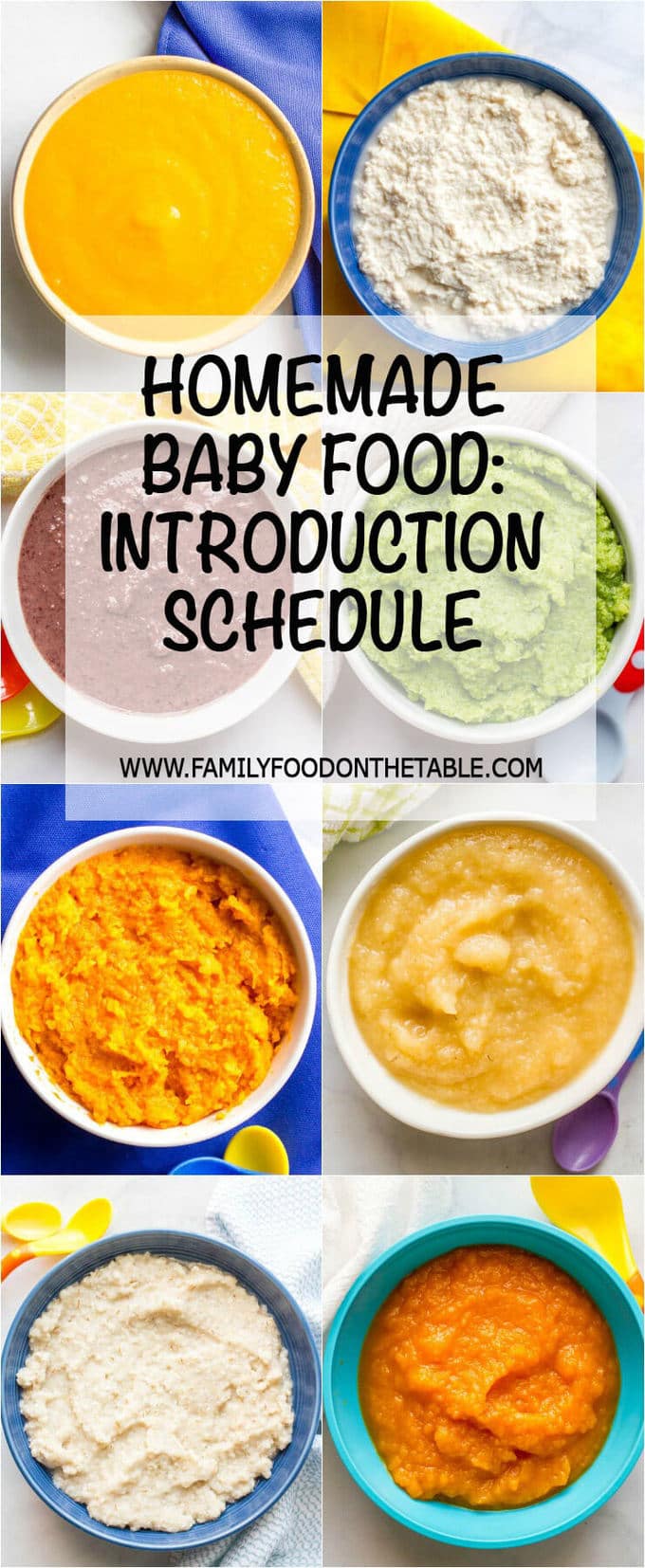
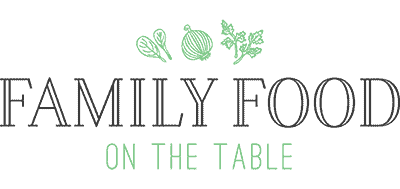

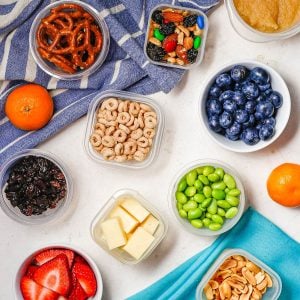
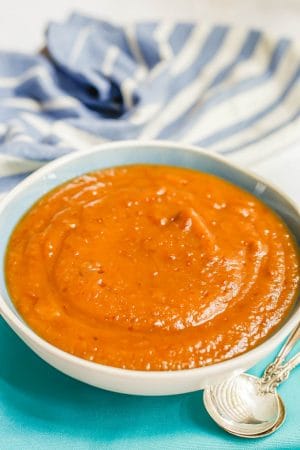
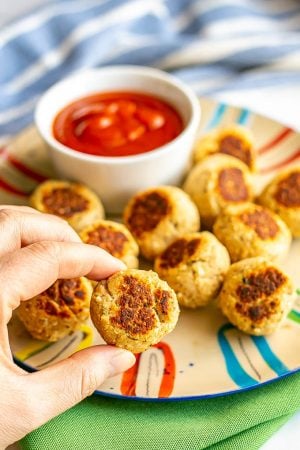
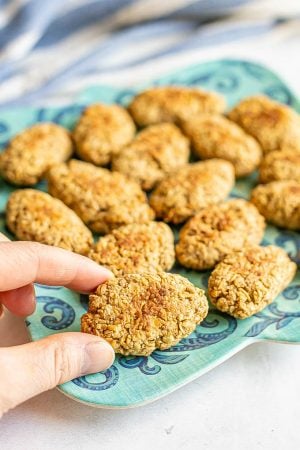
Julianne
This post is so well done! The one question that it didn't address that I'm still questioning with my 7 month old is what should the roll out be regarding quantity? I started him on solid (purees about 1.5 months ago and have worked into a fairly regular breakfast and lunchtime feeding. I've given him food at dinner time some days when it fits and/or he seems extra hungry, but other days I don't feed him solids at dinner time. I can't tell if that's ok to do to him or not. Also, I'm questioning how much to feed him at a time. Any tips for determining quantities each meal? The trouble I'm having is my little guy loves to eat and never stops himself- so it's up to me to decide how much to feed him so I'm left feeling like I don't have a clue if I'm giving him too much.
Kathryn
Hi Julianne! Good question and a tricky one since every baby is different. I had two very BIG eaters in my children but here's what I know from all my research: They typically recommend offering solids about 2 times a day until the baby is 9 months old and then increasing it to 3 times a day. (I upped it to 3x/day by 8 months with my daughter because she was devouring everything, nursing hungrily and still smallish.) The experts also say to start with about 2 tablespoons per serving and increase on demand (meaning, when your baby eats it all up and wants more). Babies and small children have a unique ability to know when they are full and to stop, so go with what your baby wants. Also, keep in mind the saying that "food before one is just for fun," meaning that your baby is still getting all the nutrition and calories he/she needs from breast milk and/or formula. The food is just for practice and to develop the taste for real, nutritions foods! I hope that helps! I have tons more info and resources on this main page and all the pages it links to if you want to check it out: https://www.familyfoodonthetable.com/homemade-baby-food/
Sarah
Hi Kathryn! I am so so SO grateful to you for all your baby food tips and recipes. They have helped me so much! One question. I don't see strawberries or watermelon on the list. Are they foods that I should avoid giving my little one? I suppose the same with oranges? Thanks!
Kathryn
Hi Sarah! I'm so happy to hear this has been so helpful! 😊 And that's a great question! Citrus fruits like oranges are acidic and most people say to hold off until the baby is at least 12 months. Apparently they can cause bad diaper rashes. I heard the some babies also get rashes from strawberries and melons like watermelon and cantaloupe so I stayed away from those during that first year. (My daughter had sensitive skin so I figured she'd be one to react.) Others say it's OK to introduce melons and strawberries after 6-8 months, so you could certainly try it. I hope that helps!
Amber
Hi Kathryn!I had my first baby in December. My little guy is almost three months old and I am strictly breastfeeding him right now. I was wondering if you suggested purees instead of rice cereal. I know that there are heavy metals in rice and would prefer not to feed that to my child. Im not a purist when it comes to my eating habits and I know everything in moderation, but I just want to be extra careful with my babies first years. Could I skip the rice cereal all together and just feed him purees. I like the oatmeal recipe and I think I might incorporate breast milk to it. Thanks for the post. I'm going to pin it!
Kathryn
Hi Amber! Congrats on your sweet baby boy! It won't be long before you start in on the solid foods and it's so much fun! As for the rice issue... it is a bit of a concern with the arsenic and the experts say it's still fine to include rice in a baby's diet, so long as it's part of a large variety of foods. I used brown rice to make my own homemade baby food puree and felt good that it was a whole grain. But I also used oats, barley, quinoa and other grains as well (as purees) to mix things up.
Here's an article from the American Academy of Pediatrics on limiting arsenic exposure for babies, in case you want to read a little more on what they say: https://www.healthychildren.org/English/ages-stages/baby/feeding-nutrition/Pages/reduce-arsenic.aspx
Hope that helps and good luck! 😊
Jessica
Hey, Kathryn! Thank you for the post! How do you freeze your baby food that you make?
Kathryn
Hi Jessica! I've got tons of info, including how and what to freeze, in the FAQ part of this post if you want to check it out: https://www.familyfoodonthetable.com/homemade-baby-food/
Here's the info on freezing baby food: It’s best to store homemade baby food in small containers with a tight seal. This allows you to portion out just a bit at a time to avoid wasting food. If freezing, you can use ice cube trays to make small cubes. Once they are frozen, transfer the cubes to a labeled freezer-safe bag. Get more info on our favorite baby food containers with my homemade baby food equipment recommendations: https://www.familyfoodonthetable.com/homemade-baby-food-equipment/ I hope that helps!
Toni
I'm a little worried about your inclusion of peanut butter for babies 4-8 months. I'm assuming it's meant to be watered down or blended with another puree, making it peanut-based per AAP recommendation, and also to avoid becoming a choking hazard? The thought of someone being crazy enough to give a baby a glob of peanut butter is terrifying!
Kathryn
Hi Toni, yes, I am always staying current on the AAP recommendations (I'm a health and nutrition editor for my day job so I read about these things regularly) and that's what they recommend now, though of course, anyone should discuss with their pediatrician or doctor if they have concerns about specific foods or allergies. I'm also completely with you that peanut butter is meant to be given in small amounts and never in chunks or globs. It should be spread on something in a thin layer to make it safe for a baby to consume.
Jessica Gamboa
Hi Kathryn! I am so grateful for your page. It has helped me out so much! I want to introduce my daughter to more meat (she has only been introduced to chicken), but I'm not sure how to introduce or what kind of red meat to introduce to her first. And for turkey, is there a certain part of the turkey you recommend introducing first?
Kathryn
I'm so happy this has been helpful for you Jessica! Meats can be tricky and a little intimidating... So ground turkey, ground beef and ground lamb can all be cooked through and served as crumbles for finger food for older babies and toddlers. If you are still doing purees, you can also cook turkey tenderloins or ground turkey and then puree it with milk, water or applesauce for serving. As for red meats, I don't eat much myself and so both of mine were older before they had them - and we served ground beef or bite-sized pieces of steak as finger food. But again, you could puree a cooked ground beef or red meat for a puree. Or make a baby version of meatballs, burgers, meatloaf, etc. - I'd just try to reduce the salt a little. I would recommend staying away from any processed meats (like deli meats, hot dogs, sausages, bacon, etc.) for a little while. And if you want some more ideas, you can check out my baby food combinations page: https://www.familyfoodonthetable.com/homemade-baby-food-combinations/ I hope that helps!
Denise
What container do you use for freezing baby food?
Kathryn
Hi Denise! I love using these small OXO freezer and storage containers for small portions http://www.amazon.com/gp/product/B004QZBEFK/ref=as_li_tl?ie=UTF8&camp=1789&creative=390957&creativeASIN=B004QZBEFK&linkCode=as2&tag=famfooontheta-20&linkId=ZOUMH3BIQF3NWC2I as well as silicon ice cube trays: http://www.amazon.com/gp/product/B002F9MUM0/ref=as_li_tl?ie=UTF8&camp=1789&creative=390957&creativeASIN=B002F9MUM0&linkCode=as2&tag=famfooontheta-20&linkId=JC2E5Q6NZLKDSKL5. You can also check out all of my baby food equipment recommendations here: https://www.familyfoodonthetable.com/homemade-baby-food-equipment/ I hope that helps!
JT Weisbarth
Can I water bath these for canning rather than freezing?
Kathryn Doherty
Hi there! I haven't tried any of these for canning, but I think it should work. Would love to hear if you try it!
Rosane
I had this excellent guide to introduce solids by Susan Urban "How to introduce solid foods to your baby" (got it here https://www.parental-love.com/shop/baby-food ). Before reading the guide, I was confused. This guide showed me how to begin, when, everything about quantities, food consistency, storing foods, allergies, etc. It's an ebook, so I had it on my phone all the time and could read it even in the store while shopping 🙂
Hope it'll help other parents too
Melinda
Rosane, this guide! it contains all the information I needed. I love that the book ends with a summary chart divided into age groups. There is so much great information here! I'll be sure to pass it on to my new mommy friends! Thanks for sharing the link
Alice
This guide is amazing! Can you believe it's the 5th one I've read and the first that actually helped? Finally!
mjididi
Can I water bath these for canning rather than freezing?
(آقا سفر)
rezaee
Can I water bath these for canning rather than freezing?
(آقا سفر )
Kathryn Doherty
Hi, I haven't done that myself, but I think it should work just fine if you follow all the proper canning safety instructions. Would love to hear if you try it!